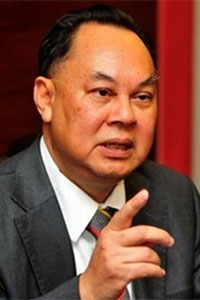
Thailand's Deputy Prime Minister and Minister of Foreign Affairs, Parnpree Bahiddha-Nukara, recently spoke at the World Economic Forum on the current situation in Myanmar and the region's response, with the speech being then printed in this newspaper.
While on the surface, the minister's words appear pragmatic to the stakeholders involved, they merely serve to help legitimise and prop up a murderous regime while ignoring the reality of Thailand's role over the past three years.
The minister's solitary talks with Myanmar's foreign minister are particularly troublesome. After almost three years of atrocities committed by the Tatmadaw during this civil war -- which is believed to have led to the deaths of at least 20,000 civilians, the internal and external displacement of close to two million people, and an incalculable number of homes and businesses destroyed -- for Khun Parnpree to continue this formal recognition of the junta and his counterpart is extremely unbecoming, but unfortunately not surprising.
In noting that Myanmar's democratic and economic progress over the prior decade has unravelled with seemingly no end to this crisis in sight, the minister failed to mention why this occurred and who was responsible.
Refusing to acknowledge that the Junta is the sole reason for this destruction of democracy, society, and millions of lives is damaging to the government's credibility on its own. When taken in conjunction with empowering his counterpart and the Junta in general, however, Khun Parnpree is inherently signing off on the Junta's actions. This also ignores the fact that the conflict could end tomorrow. The Junta could unilaterally bring about a return to peace by ceasing the commission of atrocities against its citizens and allowing the democratically elected government to return to power.
As with any major conflict, the fear of Myanmar becoming an arena for major-power competition is justified. Besides the abundance of natural resources it holds, its location linking Southeast Asia to South Asia, and the vast waters that the country opens up into, Myanmar represents a position of significant importance to the biggest players in the region. That being said, Thailand has been an active participant in the arena since the coup occurred, going well beyond merely inherent support.
Since the coup took place, Thailand has exported tens of millions of dollars' worth of arms, military equipment and raw materials to the Tatmadaw to be used in all facets of their war against the Myanmar people. Additionally, the Thai military has helped the Tatmadaw by not only turning back untold numbers of people from Myanmar seeking refuge and political asylum in Thailand but also by forcefully returning those who have crossed into the country, knowing that doing so would likely result in death at the hands of the junta. If only this new-found concern over foreign influence had existed three years previously, perhaps we would already be talking about Myanmar's return to peace and prosperity.
The minister speaks of the need for enhanced humanitarian assistance and creating a bilateral initiative between the countries to do so. While it is imperative that humanitarian assistance be provided to the millions of civilians who are injured and displaced, these words and actions ring particularly hollow. There are a multitude of NGOs and CSOs that have the ability to provide such assistance and cross-border aid, whose efforts the Thai government have been hampering for years.
Even if we ignore these prior actions, how can this initiative be taken seriously without incorporating local groups who have the experience of providing to those in need across the border or including the border ethnic minorities themselves who require such assistance?
Additionally, the minister hopes that such humanitarian assistance can lead to a ceasefire when in reality, a ceasefire is required to ensure that such aid can be provided effectively and securely. For almost three years, the people of Myanmar have been facing constant violence while severely lacking medical care and supplies. Without pushing the Tatmadaw to agree to a ceasefire immediately, any humanitarian aid that might even trickle down to those in need will merely be a band-aid on a gunshot wound.
Overall, the Thai government is setting the wrong priorities, as they continue to forget about the larger picture of achieving political success through dialogue by ignoring the existence of the opposition forces in Myanmar, whether it's the National Unity Government of Myanmar (NUG), National Unity Consultative Council (NUCC), Committee Representing Pyidaungsu Hluttaw (CRPH) or any ethnic minority groups.
If the government insists on continuing discussions with the junta, there must be a balancing act whereby opposition forces are given equal standing and time. Otherwise, these conversations will continue to be ineffective.
With the significant gains made by the opposition in recent months bringing things closer to the crisis' inevitable ending, the main goal for Thailand and Asean leaders should be to immediately bring an end to the fighting, rebuild the country and focus on a return to democracy under a federally democratic Myanmar.
